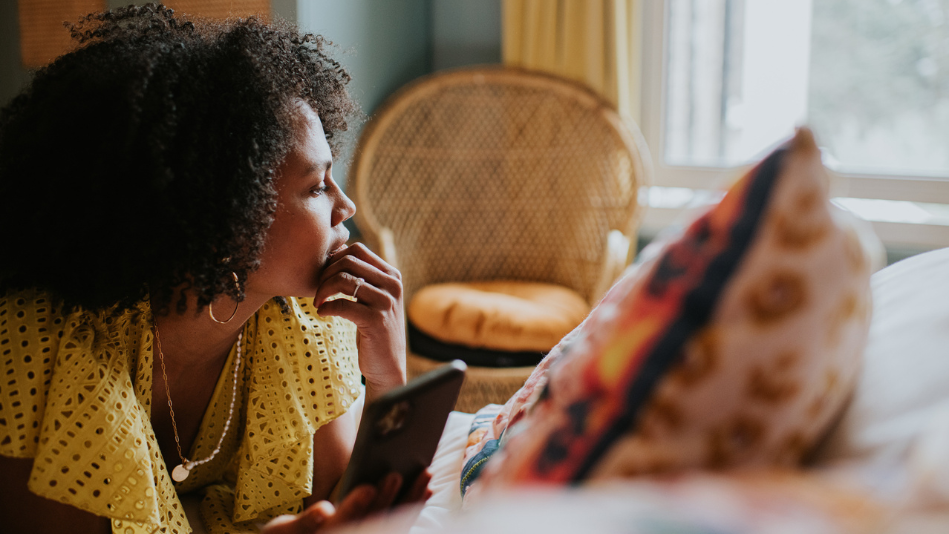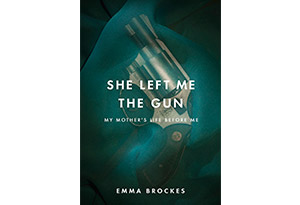4 Mysteries That Shape Every Thinking Woman's Life
Emma Brockes, author of She Left Me the Gun: My Mother's Life Before Me, explains how questions with no right answers can be confounding—and can also crack open a whole new set of possibilities.

Photo: Catherine Falls Commercial/Getty Images
The great thing about unanswerable questions is that, being unanswerable, there are no right or wrong ways to respond to them. How each of us chooses to reach a conclusion becomes both a test and a measure of our character. It is by picking answers to these unknowable questions that we learn how to shape the story of our lives.
Would I Have Been Happier If...?
This is the question we all drag behind us, like a sack of rocks that slows us down and makes it hard to execute clean decisions. Unlike other unknowables—Is there a God? Will I fit into these jeans again? Where do pigeons go at night?—thinking about this question will never lead to enlightenment. Once you have made a decision, everything that comes after it, depending on your disposition, either skews in the direction of validating your choice or fans the flames of regret. Only one thing is guaranteed: that while you may, in fact, have been happier taking another direction, you will never, ever be happy in a state of dithering, unresolved, regret-soaked uncertainty. At the risk of sounding like a badly translated fortune cookie, to make a choice correctly, you have to decide it's the right choice.
What Do They Really Think of Me?
Some of them probably hate you. Face it. They hate the way you look and they hate the way you talk. They don't value your contribution. So what? Any decision made with an eye on how others' will perceive it is almost always a bad one. My instinct, actually, is to believe that people don't hate you at all (though they may find the way you chew slightly annoying). Assuming that no one is devoting as much time to thinking about you as you devote to thinking about how they're thinking about you, the takeaway from this question is one, surely, of empathy. Whether we like each other or not, we are united by a common fear of rejection. Thinking about this question may not lead to the insight we want, but perhaps it makes us a little less anxious, and a little kinder in the face of each other's annoyingness.
How Did She Do It?
I'm a journalist who spends lots of time interviewing people who have rebuilt themselves after experiencing terrible trauma. The thing I always wonder is this: When you have been through the fire, how do you reboot? My mother was a prime example, having endured horrific traumas as a child; then later emerging to have a happy and successful adult life. We never talked about it, but it's my hunch that, when you've been through the worst, all other anxieties that may follow become secondary. After the experience of fending off someone trying to kill you, fretting about your co-workers seems laughably trivial. You are, to some degree, free. For those of us lucky enough to have escaped major trauma, this principle is scalable. No one has led an entirely charmed life. Is the thing worrying you right now as bad as the worst thing you have ever known? Probably not. So relax.
Where Will It All End?
Ah. In darkness or in light. We all choose our position on the spectrum. I'm nearer to the atheist than the believer end; on the other hand, I'm very susceptible to thoughts that begin, "On the other hand..." My mother, before she died, said matter-of-factly, "I'll look into whether there's a way to come back," as if it were another possible mode of transportation. If anyone could find it, she could; and so, the fact that she hasn't, inclines me to think it's not doable. On the other hand, a week after my mother died, a huge sunflower taller than my head, stalk thicker than my wrist, sprung up in the garden from nowhere. Sunflowers were her favorite. So, I keep asking this question over and over again, to give rise to potential alternatives. Isn't that all any of us want—options?
 Emma Brockes is the author of She Left Me the Gun: My Mother's Life Before Me (The Penguin Press).
Emma Brockes is the author of She Left Me the Gun: My Mother's Life Before Me (The Penguin Press).
Would I Have Been Happier If...?
This is the question we all drag behind us, like a sack of rocks that slows us down and makes it hard to execute clean decisions. Unlike other unknowables—Is there a God? Will I fit into these jeans again? Where do pigeons go at night?—thinking about this question will never lead to enlightenment. Once you have made a decision, everything that comes after it, depending on your disposition, either skews in the direction of validating your choice or fans the flames of regret. Only one thing is guaranteed: that while you may, in fact, have been happier taking another direction, you will never, ever be happy in a state of dithering, unresolved, regret-soaked uncertainty. At the risk of sounding like a badly translated fortune cookie, to make a choice correctly, you have to decide it's the right choice.
What Do They Really Think of Me?
Some of them probably hate you. Face it. They hate the way you look and they hate the way you talk. They don't value your contribution. So what? Any decision made with an eye on how others' will perceive it is almost always a bad one. My instinct, actually, is to believe that people don't hate you at all (though they may find the way you chew slightly annoying). Assuming that no one is devoting as much time to thinking about you as you devote to thinking about how they're thinking about you, the takeaway from this question is one, surely, of empathy. Whether we like each other or not, we are united by a common fear of rejection. Thinking about this question may not lead to the insight we want, but perhaps it makes us a little less anxious, and a little kinder in the face of each other's annoyingness.
How Did She Do It?
I'm a journalist who spends lots of time interviewing people who have rebuilt themselves after experiencing terrible trauma. The thing I always wonder is this: When you have been through the fire, how do you reboot? My mother was a prime example, having endured horrific traumas as a child; then later emerging to have a happy and successful adult life. We never talked about it, but it's my hunch that, when you've been through the worst, all other anxieties that may follow become secondary. After the experience of fending off someone trying to kill you, fretting about your co-workers seems laughably trivial. You are, to some degree, free. For those of us lucky enough to have escaped major trauma, this principle is scalable. No one has led an entirely charmed life. Is the thing worrying you right now as bad as the worst thing you have ever known? Probably not. So relax.
Where Will It All End?
Ah. In darkness or in light. We all choose our position on the spectrum. I'm nearer to the atheist than the believer end; on the other hand, I'm very susceptible to thoughts that begin, "On the other hand..." My mother, before she died, said matter-of-factly, "I'll look into whether there's a way to come back," as if it were another possible mode of transportation. If anyone could find it, she could; and so, the fact that she hasn't, inclines me to think it's not doable. On the other hand, a week after my mother died, a huge sunflower taller than my head, stalk thicker than my wrist, sprung up in the garden from nowhere. Sunflowers were her favorite. So, I keep asking this question over and over again, to give rise to potential alternatives. Isn't that all any of us want—options?
 Emma Brockes is the author of She Left Me the Gun: My Mother's Life Before Me (The Penguin Press).
Emma Brockes is the author of She Left Me the Gun: My Mother's Life Before Me (The Penguin Press).



